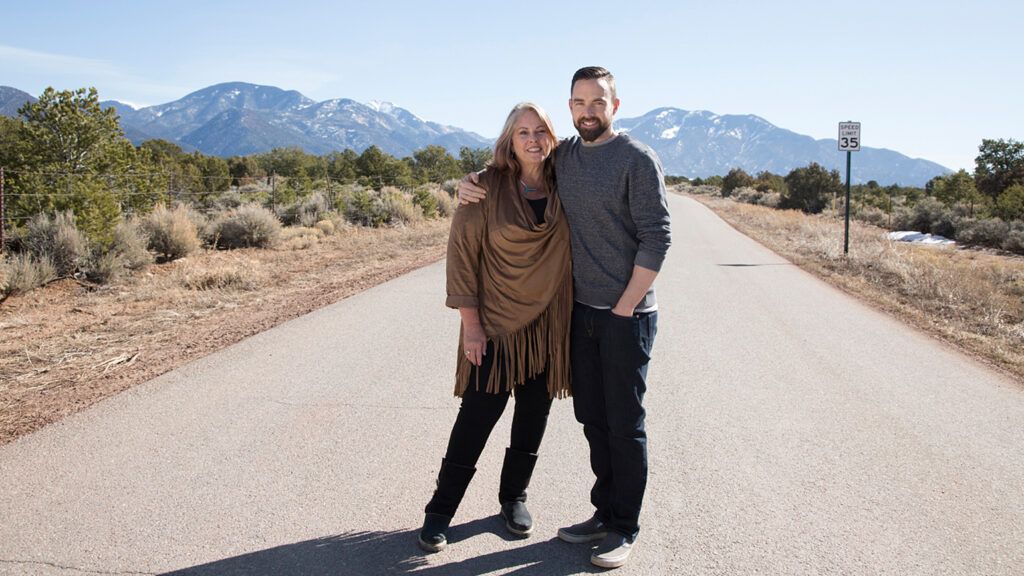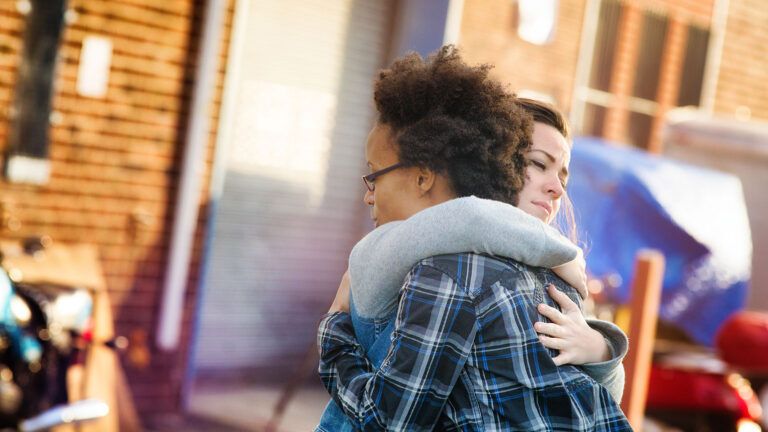Nighttime phone calls are never good news when you’re the mother of a drug addict. My phone rang at 10 o’clock on a frigid Friday evening in January.
“Mom, it’s Ben.” My 27-year-old son’s voice had the forced it’s-not-as-bad-as-it-sounds tone he used whenever his addiction took another disastrous turn.
“What’s going on?” I asked, trying to control my own voice. After nearly a decade of doing everything I could to help my son overcome his pain-pill addiction, I’d started going to Al-Anon meetings. I was learning—slowly—how powerless I was to solve Ben’s problems. I’d probably made things worse, enabled him, by rescuing him so many times over the years.
“I got kicked out of the sober-living house,” Ben said. “It wasn’t my fault! They found the anxiety medication I was taking—remember, you refilled the prescription for me? I didn’t realize I wasn’t allowed to have it.”
I slumped into a chair. “Where are you?” I asked. “At Orlando’s church.” Orlando was Ben’s probation officer. “He called the sober-living house and they agreed to take me back next week so long as all of the medication is out of my system.”
“That sounds positive,” I said.
Ben paused before saying, “There’s just one thing. I need you to come to Colorado to stay with me in a motel until the house takes me back. I’m broke, I don’t have anywhere else to go and I don’t trust myself alone.”
I stared out the kitchen window into the darkness, wishing—as I’d wished every single minute of the past 10 years—that my husband, Rick, was there with me. Rick died of cancer when Ben was 17. Ben’s older brother, Danny, had already left for college. Ben was devoted to his dad and incredibly close to his brother. Rick had been a National Park Service ranger and we’d moved around a lot when the boys were young, before settling down in Estes Park, a small Colorado mountain town, where Ben still lived. We were a close-knit family. Rick’s death shattered all of us.
Ben—intuitive, creative, sensitive—suffered most of all. He numbed the pain with alcohol, then pills. He was 25 when he broke into a pharmacy, stole bagfuls of pills, then stared straight into the security camera—a last-ditch plea for help. When the image was published in the local paper, everyone knew exactly who it was, just as Ben had hoped they would.
Over the years, even after moving from Estes Park to teach elementary school in Taos, New Mexico, I’d covered up for Ben, rationalized, helped him to find jobs, paid his rent, loaned him money—basically everything you’re not supposed to do for an addict. I loved Ben. I leaned on the boys after Rick died. I wasn’t thinking clearly.
Well, now I was thinking clearly. Everything inside me shouted, Let him clean up his own mess!
What I said, though, was, “Let me talk to Orlando.”
Orlando corroborated Ben’s story, with an additional frightening detail: Ben had so much medication in his system that a detox center refused to take him because they feared he would go into seizures.
“We’re in danger of losing him,” Orlando said. “I think you should come.”
“Okay,” I said with a sigh.
I left a message with the principal at my school—we’d just returned from Christmas break; it was a terrible time for me to leave—and got on the road before sunrise.
Driving along the snowy highway, I repeated the Al-Anon prayer a friend from the group had prayed with me when I called to tell her what I was doing: God, I offer myself to you. May I always do your will.
My mind groped for happy memories. I remembered the boys skiing off our roof after a massive snowfall in Sequoia National Park. Endless football games in the yard no matter where we lived. We were huge Denver Broncos fans—Rick and I met in high school in Colorado and some of our first dates were at Mile High Stadium (Rick’s family had season tickets). We took the boys to games starting when they were toddlers. After Rick died, we kept going. The sight of those blue-and-orange uniforms made us feel closer to Rick.
I kept praying the Al-Anon prayer. But I still had no idea what to do when I pulled up at Orlando’s church in downtown Fort Collins, the town where the sober-living house was. Ben was in the sanctuary, sitting by a set of drums on the stage. He looked tired and pale but not as bad as I’d feared. I hugged him for a long time, reluctant to let him go.
“I like it here,” Ben said. “I spent the whole night listening to music and reading the Bible.” He showed me a well-thumbed Bible he’d picked up somewhere. I tried not to ask too many questions. I was afraid of the answers.
I checked us into a motel and we got some breakfast at a diner.
“The sober-living house gave me a list of businesses that employ recovering addicts,” Ben said, pulling out a sheet of paper. “Can we see if any are hiring?”
My eyebrows rose, but I couldn’t say no to that. We drove around town and Ben filled out applications.
The next morning, Sunday, Ben said he wanted to go to Orlando’s church. My eyebrows rose again. I couldn’t remember the last time Ben went to a church service.
I was even more surprised when he got up to help collect the offering. He was already volunteering? The pastor, it turned out, had played football in college. Ben listened intently to the sermon.
“Whatever challenges you’re facing,” the pastor said, “whenever you feel most alone—that’s when God is closest. He will never turn his back on you. He will never give up on you.”
Ben lingered after the service, then asked if I could give rides to some guys he knew from the sober-living house.
Finally it was just Ben and me in the car. I felt conflicted. I wanted to be encouraged by his behavior. I wanted to keep him going in this new direction. But doing something he should be able to do for himself—that went against everything I’d been learning in Al-Anon. Plus, addicts are experts at making you think they’re turning a corner. I’d been fooled before. Many times.
“Mom,” he said quietly. “There’s something I haven’t told you.”
Here it comes, I thought.
“Those anxiety pills I had at the sober-living house—they kicked me out because I took all of them. Mom, I tried to kill myself.”
“Oh, Ben,” I said.
“But I heard something during the sermon this morning,” he continued. “The pastor said God never gives up on people like me. That sounds like Dad. He never gave up either. Dad would have wanted me to live. And I think God does too. I feel like I’m ready to take this whole recovery thing seriously now.”
I hardly knew what to say. I told Ben I hoped he meant it because I wanted him to live too.
Suddenly he grinned. “Hey, I know the perfect way to celebrate. Let’s go watch the Broncos’ playoff game!”
It was a huge relief to sit down at a restaurant and let our beloved Broncos distract me from my overflowing emotions. Ben and I cheered and pumped our fists every time the Broncos moved the chains. The game was tied at the end of the fourth quarter.
A commercial came on. “Time to go to church,” Ben said. “The evening service starts in fifteen minutes.”
“What?” I exclaimed. “The game is about to go into overtime. We can’t miss that! Besides, we’ve already been to church once today.”
Ben stood up. “Mom, we’ve got to go.”
I hate to admit it, but I was seriously irked. Walking to the car, Ben said he’d noticed that Demaryius Thomas, the Broncos’ wide receiver, had been in single coverage the entire game. If the quarterback, Tim Tebow, could get a pass to Thomas over the middle, Ben said, Thomas could easily elude his defender and score.
“We won’t know if he does, since we have to go to church,” I said testily.
Ben relented. “Let’s just see what’s happening,” he said, poking his head into another restaurant that had the game on. I followed him. Right at that moment, Tim Tebow threw an arcing pass to Thomas, who danced around his defender and ran 80 yards for a touchdown. Ben and I stared at each other in elated astonishment.
“Okay,” said Ben, “let’s go to church.”
There was no sermon at the evening service. Members of the congregation got up to talk about how God was at work in their lives. I was startled when Ben suddenly brushed by me and walked up the aisle.
He stood at the microphone, glancing nervously at the crowd. Then he told how he’d been struggling to find his way out of addiction for a long time.
He held up the Bible I’d seen him reading the day before. “My probation officer recently gave me this,” he said. “I’ve been thinking about a verse I found, John 3:19: ‘The light has come into the world, and men loved darkness rather than light because their deeds were evil.’”
He paused and I could tell he was summoning his resolve. “I am tired of walking in darkness,” he said. “I am ready to step into the light. I am a Christian.”
The congregation burst into applause, and the sound buoyed me up like no Broncos playoff win ever had. I felt my own darkness lift. For the first time I saw clearly that God wanted me, too, to take Ben’s recovery seriously. In a way I’d also been an addict—addicted to enabling his addiction. But my job was simply to love my son. And to give him wholeheartedly to the One who loves perfectly and who never gives up on us.
Ben returned to his seat beside me and I hugged him for a long time. Then I let him go.
Today, Ben is married and works full-time as a mentor and cook at a residential addiction-recovery center in Taos. He’s finishing college and he plans to spend his life helping addicts do what he did—step out of the darkness and into the light.
I’m confident he’ll do an excellent job. I was his first success story.




